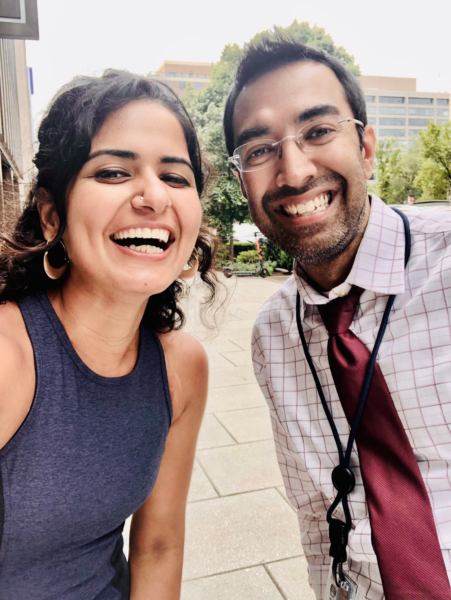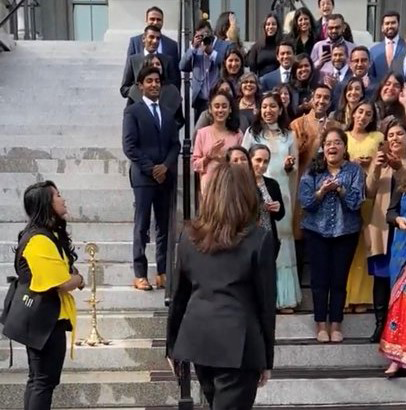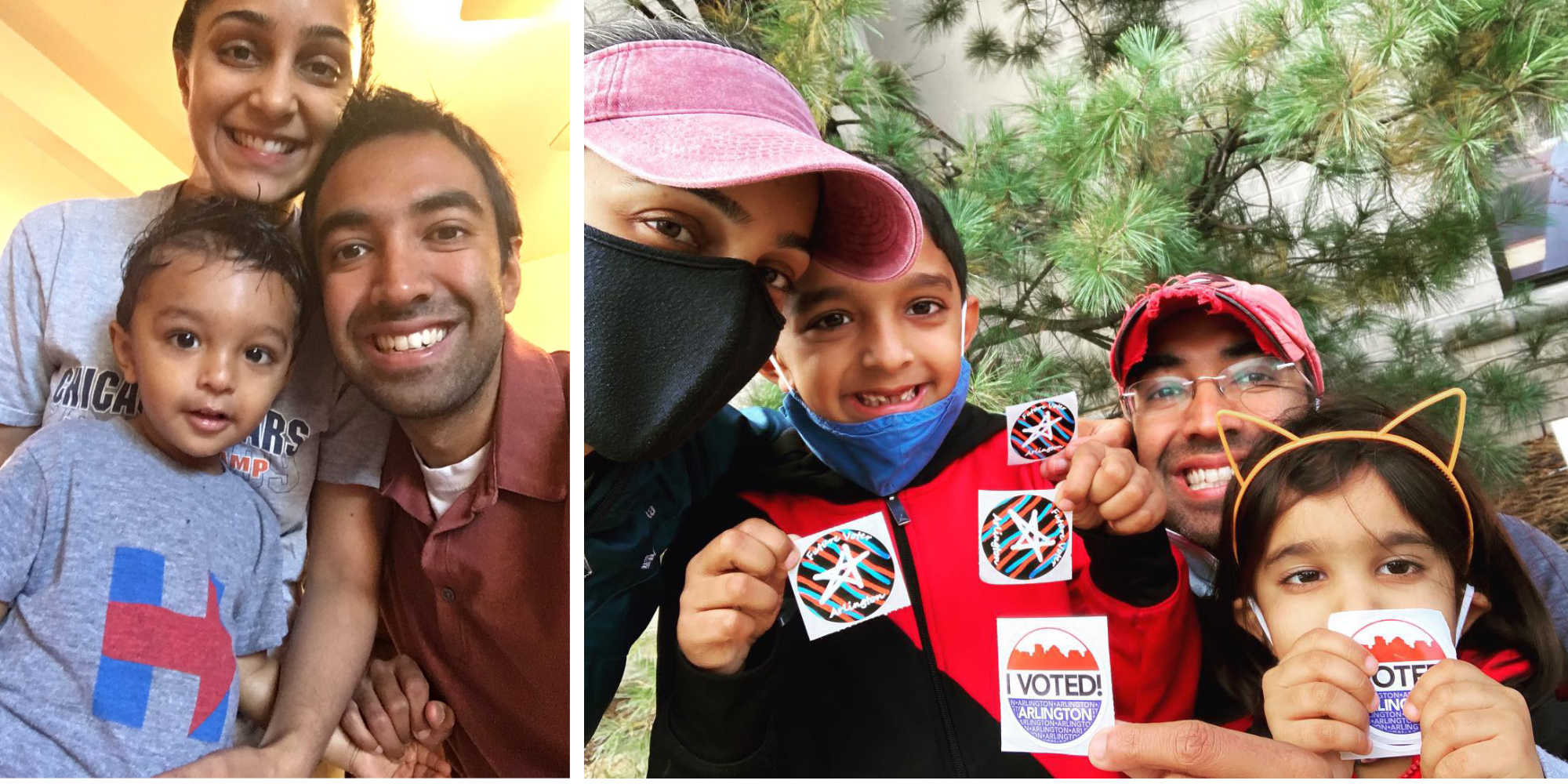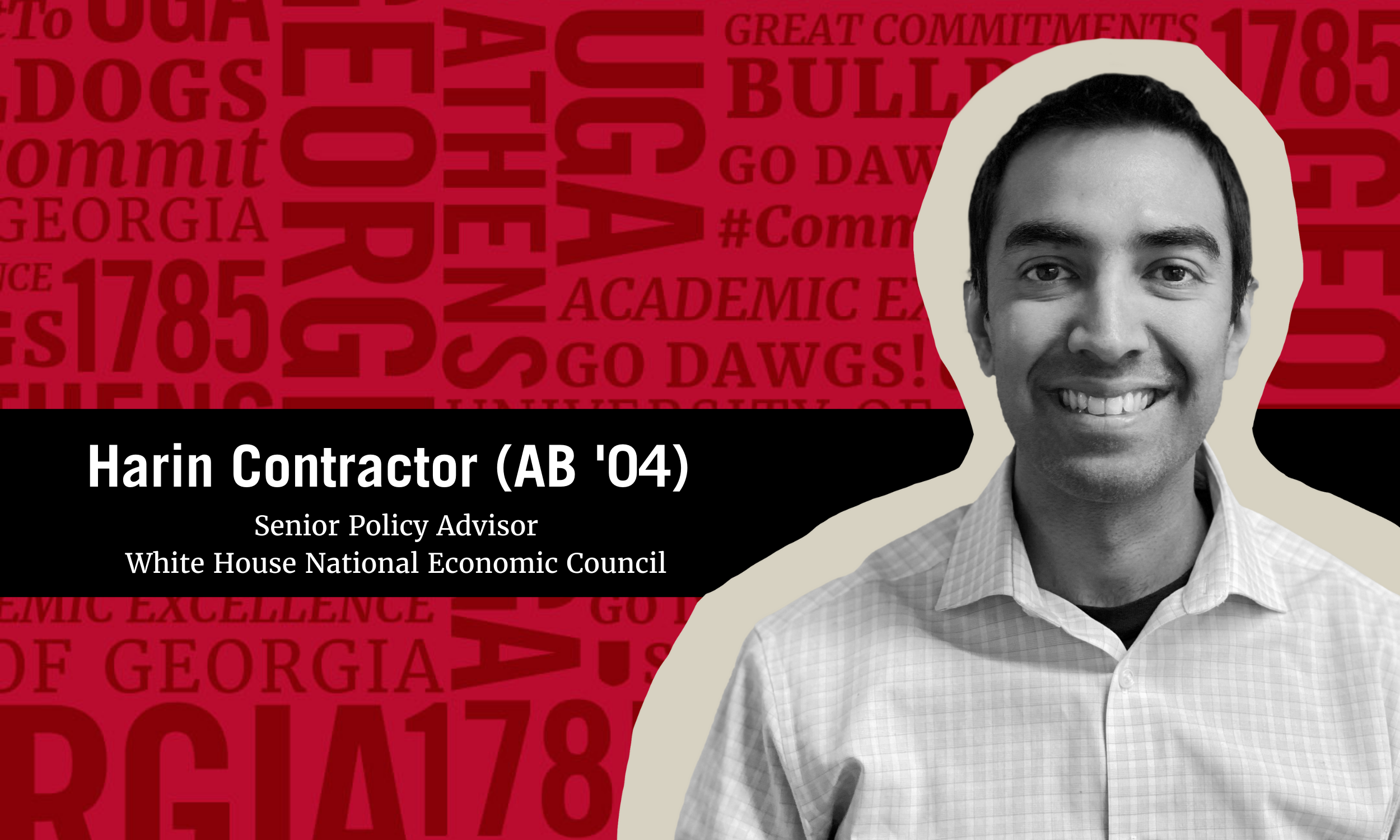Still struggling to square the violence with his place in the world, Contractor stepped into Dr. Loch Johnson’s classroom in the spring of 2002.
“Coming into class every day and getting his real-world experience and perspective into the beginnings of the “War on Terror” was extremely informative,” he said. “In a time in which everyone was unifying around these tragic events and supported our war against Al Qaeda, it was Dr. Johnson who challenged us to look at the perspectives of our troops, the people in the region, and the implications of our actions. [Even now,] it helps remind me that though consensus opinion may go one way, it’s worth stepping back to ensure we are seeing the bigger picture.”
That summer, Contractor participated in the Washington Leadership Program (WLP), sponsored by publisher and philanthropist Gopal Raju, which placed more than 170 South Asian American students in Congressional internships.

Washington Leadership Program alumni Harin Contractor and Areeba Kamal connect. (photo source: Twitter/@harincontractor)
“Back then, there were not many people who looked like me in positions of influence in policy and politics,” said Contractor. “If there were, maybe we would have had voices to stand up during the rash of violence against Brown communities. The WLP introduced me to a community of South Asian Americans who were politically and policy motivated, from all over the political spectrum.”
When the original WLP ended in 2007, Contractor joined a group of program alumni to resurrect Raju’s legacy as a purely volunteer-led nonprofit organization placing 10-15 South Asian American college students in Capitol Hill internships.
Though Contractor may be proudest of his philanthropic achievements, he racked up varied and formidable professional milestones almost immediately. He earned his Masters of Public Policy from the University of Chicago in 2008, and went on to tackle one impactful job after another, across sectors and concentrations.
“Working through the public, private, nonprofit, government, technology, business, and think tank worlds has given me an appreciation for how each sector approaches problem solving and execution,” he said. “In public service, we are often working across a variety of teams, multiple projects/crises, and on issues that affect people of all backgrounds.”
After graduate school, he accepted a position with government contractor Booz Allen Hamilton, on programs to introduce remote counseling to veterans for the Veteran Affairs Administration, improve grant application systems for the Department of Commerce, and analyze inspector data for the Federal Aviation Administration. In 2012, he transitioned into government itself, as economic policy advisor in the U.S. Department of Labor under President Obama. He briefed the Secretaries of Labor Hilda Solis and Tom Perez on economic indicators such as the unemployment rate, labor force participation, and unemployment claims, issues that had shaped his worldview since childhood.
“I’m the son of a 20 plus year Wal-Mart clerk, and of a civil engineer who was time and time again passed over for promotions and changed jobs,” he said. “I took their experiences with me every day to work.”
At DOL, Contractor and the rest of the team focused on recovery from the Global Financial Crisis by designing solutions for small businesses, workers, and governments. Though a divided Congress hampered many proposed solutions, the administration was able to provide much needed relief, which laid a stronger economic foundation for a familiar future crisis.
“Our Administration took those lessons and put tremendous support and checks into people’s hands,” he said, “and the results have been incredible. S&P found that city financial situations are stable coming out of the pandemic, due to federal aid, significantly lower poverty (particularly childhood poverty), and the largest growth in start-ups in 40 years.”
During this period, Contractor communicated with economics reporters as part of his job. Soon, word spread that he could translate complex economic information into readable content, and he became a regular media contributor for outlets like The Hill, The Observer, HuffPost, Washington Monthly, and Vox. He has continued the practice, with a focus on inclusive recovery efforts.
“I thought many of the mainstream outlets only really covered the top lines on the economy,” he said. “So instead of complaining or arguing on the internet, I channeled my energy to writing and speaking on the topic. I was fortunate to have outlets who wanted to hear my voice and ideas, and now I have an opportunity to put those ideas into action.”
Next, Contractor cycled through analytics positions in the private sector before joining the Joint Center for Political and Economic Studies in 2018, as director of Workforce & Economic Policy. Notably, he contributed analysis and original research to the Future of Work survey, which tracks challenges and opportunities presented by the changing nature of work for Black communities.
“The Black community has faced, and continues to face, systemic barriers that hinder economic progress and mobility,” Contractor said. “The data and evidence of discrimination and barriers are clear.”
Predictions about the effect of automation on American workers suggest that African Americans are over-represented in the jobs that will be hit the hardest. Contractor warns that as the nature of work changes, responding policy must remove barriers to inclusivity and enable mobility for Black Americans.
“[While previous] industrial change has provided pathways and opportunities for the Black community, we must ensure policies are fully inclusive,” he explained. “The GI Bill after WWII was one of the greatest levers of economic mobility, lifting up a new American middle class; however, when the policy was enacted, southern schools were still segregated, and very few would accept African Americans.”
Contractor embraces the imperative of inclusivity in his current position as well. As senior policy advisor, he leads the NEC’s workforce

Contractor celebrates Diwali in Nov. 2021 at the White House with Vice President Kamala Harris. (photo source: Twitter/@harincontractor)
development and training policy portfolio under Director Brian Dees, in collaboration with the Domestic Policy Council and other federal agencies.
“Our role is to develop policies and coordinate agency execution to help rebuild the American economy from the pandemic in an inclusive way, a path of growth and mobility for the millions who have not experienced wage gains or wealth creation over the last two decades,” he said.
His White House day-to-day tasks shift according to current priorities, which has recently meant providing input for the Infrastructure Investment and Jobs Act and analyzing whether and how training programs can support supply chain resilience and domestic re-shoring efforts. The overarching mission, he explained, is to translate investments in human capital, such as training in digital skills and literacy and registered apprenticeships, into higher wages and better overall economic outcomes.
“It is the President’s goal to improve our training infrastructure and enable public-private partnerships to provide pathways to employment and career growth for workers,” he said. “Without a strong and flexible training apparatus, we will not be in a position to act on the historic infrastructure investments we are aiming to pass that may change the trajectory of this country.”
Contractor feels a special amazement when he walks the White House corridors and sees the wide variety of races, cultures, and experiences represented.
“Every day, I walk into those hallowed halls, carrying the experiences of my family and my community with me,” he said. “I’m fortunate to work for the President and Administration that brought in the most diverse White House ever. Diversity has always been the strength of our country; having a government that reflects America, I truly believe, will help ensure there are no blind spots when it comes to policy and decision making.”

In the headiness, and heaviness, of the life he has built, Contractor remembers to dance, and to celebrate the life-giving nature of his own culture.
“Now I have the pleasure of seeing the absolute joy in the faces of my six- and three-year-old when we dance to Bollywood songs at home,” he said with a smile. “Sometimes the mango doesn’t fall far from the tree.”




